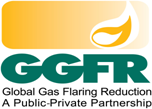Methane International
The Global Methane Initiative Update
Issue 31, May 2013
Thank You, Vancouver! Expo Draws Hundreds from Around the World
Methane Expo 2013 was a great success! This year’s Expo drew over 450 attendees representing 44 countries from around the world. Thank you to Canada for hosting the event and to all the supporters and exhibitors who contributed their time and resources.
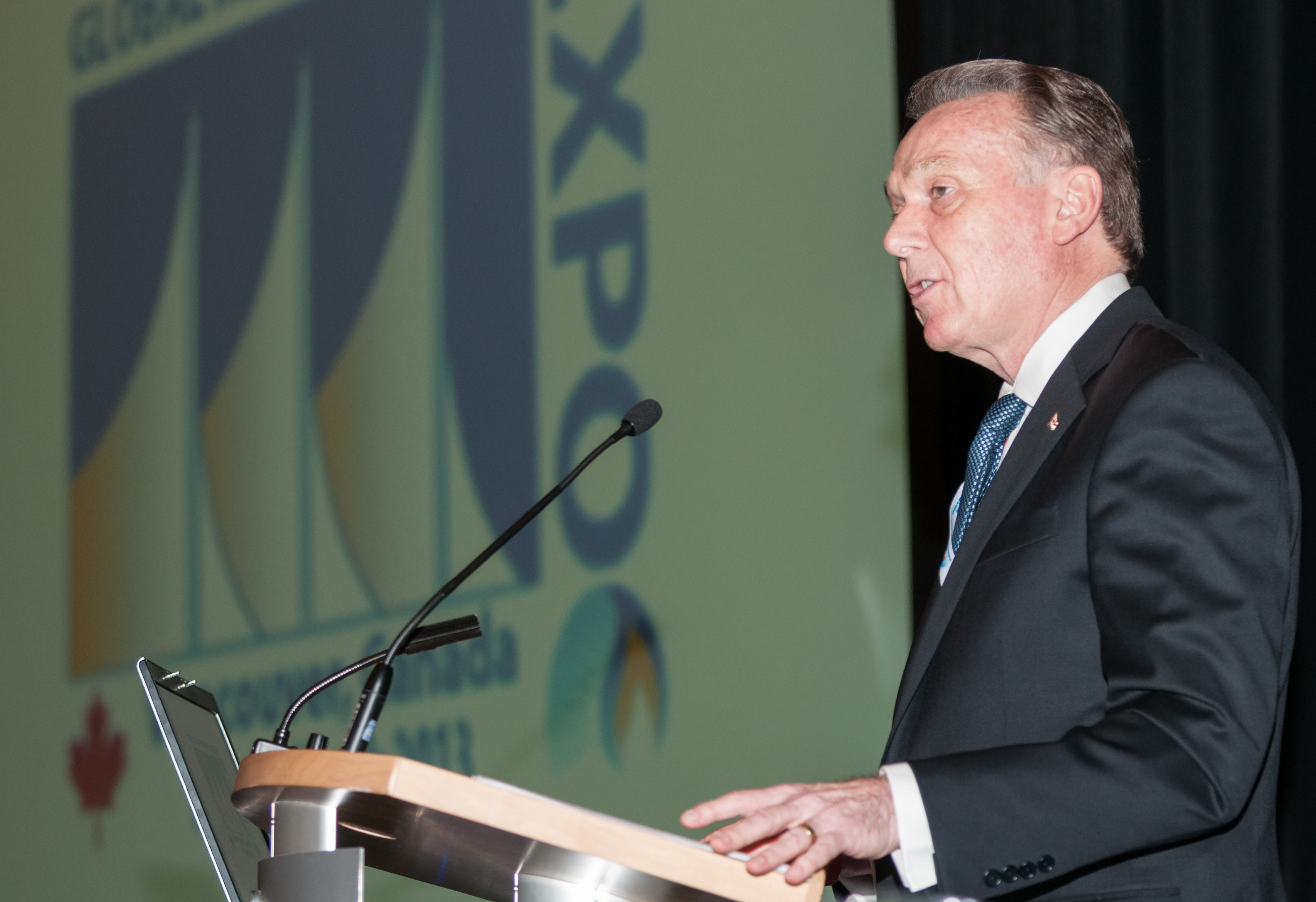
Photo by Bayne Stanley/Courtesy of Environment Canada.
“We are here together for one simple reason and that is that methane matters. It
matters in our fight against global warming, in the quality of our air, water cycle,
and crop yields. And it matters to our health.” - The Honourable Peter Kent,
Minister of the Environment of Canada, Methane Expo 2013
keynote speech

The Expo had something for everyone: high-level plenary sessions and talks, detailed technical talks on issues related to promoting methane projects and reductions in each of the GMI sectors, educational site tours of methane reduction activities, and a poster area that included over 90 methane emissions reductions project opportunities and success stories that showcased the real, on-the-ground accomplishments of GMI.
Canada’s Environment Minister, the Honourable Peter Kent, gave the keynote address. Acting GMI Steering Committee Chair Janet McCabe (U.S. EPA), and the Honourable Terry Lake (British Columbia’s Minister of Environment) also participated.
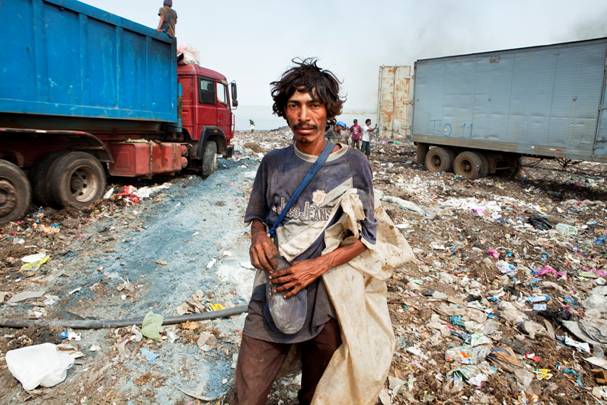 Photos by Tim Bouldry showcased at the 2013 GMI Expo.
Photos by Tim Bouldry showcased at the 2013 GMI Expo.
Other Expo highlights were:
- A photo exhibit by Tim Bouldry of people living near landfills and dumps. This exhibit was showcased throughout the landfill poster area, highlighting the human benefits of moving from open dumps to managed landfills that can then support landfill gas (LFG) projects.
- The plenary sessions included a panel on international methane financing. Speakers from the Inter-American Development Bank, the World Bank, the Asian Development Bank, and SENES Consulting provided attendees with information and tools on ways to reduce barriers to financing. Another plenary session explored different ways municipal leaders from Canada, Colombia, and Sweden overcome common sustainability concerns.
- The Climate and Clean Air Coalition to Reduce
Short-Lived Climate Pollutants (CCAC)
 and the Center for Clean Air Policy (CCAP)
and the Center for Clean Air Policy (CCAP)
 hosted side meetings on National Appropriate Mitigation Action (NAMA) plans in the
waste sector. The Steering group of the CCAC Municipal
Solid Waste (MSW)
hosted side meetings on National Appropriate Mitigation Action (NAMA) plans in the
waste sector. The Steering group of the CCAC Municipal
Solid Waste (MSW)
 Initiative met with representatives from cities around the world to provide an opportunity
to develop action plans to reduce methane and black carbon from the sector by implementing
solutions such as organics management and methane capture from landfills. Representatives
from Colombia, Chile, and the Dominican Republic presented the results of the development
of integrated
solid waste management NAMAs
Initiative met with representatives from cities around the world to provide an opportunity
to develop action plans to reduce methane and black carbon from the sector by implementing
solutions such as organics management and methane capture from landfills. Representatives
from Colombia, Chile, and the Dominican Republic presented the results of the development
of integrated
solid waste management NAMAs
 supported by Canada through its $1.2 billion
Fast-Start Financing
supported by Canada through its $1.2 billion
Fast-Start Financing
 commitment.
commitment. - On the margins of the Expo, the World Bank hosted the final meeting of the Methane
Finance Study Group, whose goal is to develop a series of recommendations for G8
countries to explore innovative ways to finance methane projects. The Group published
the
Methane Finance Study Group Report: Using Pay-for-Performance Mechanisms to Finance
Methane Abatement
 .
The report considers whether and how public funds, utilizing pay-for-performance
mechanisms, could be used to incentivize reductions of methane emissions. The authors
found that pay-for-performance initiatives should be further adopted for methane
mitigation and that, over time, pay-for-performance can be used to support methane
emission reductions for NAMAs, national goals, or bilateral agreements.
.
The report considers whether and how public funds, utilizing pay-for-performance
mechanisms, could be used to incentivize reductions of methane emissions. The authors
found that pay-for-performance initiatives should be further adopted for methane
mitigation and that, over time, pay-for-performance can be used to support methane
emission reductions for NAMAs, national goals, or bilateral agreements.
Committee Updates
Steering
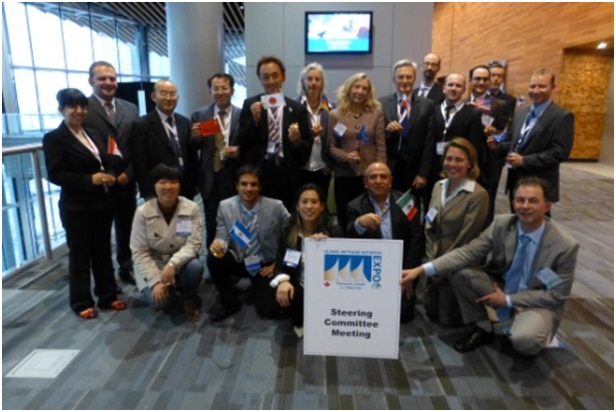 The Steering Committee poses at Methane Expo 2013.
The Steering Committee poses at Methane Expo 2013.
The Steering Committee, which guides the work of the Initiative, discussed strategies to encourage countries to complete their Country Action Plans, which are used to identify specific needs and opportunities for methane reductions. They also talked about GMI’s relationship with CCAC, issues associated with financing methane projects, and greater sector engagement in subcommittee meetings.
The Steering Committee meeting concluded after three days of discussions and presented their decisions at the closing plenary. The action items agreed upon include:
- Improving communication and linkages with CCAC.
- Encouraging all partner countries to develop flexible Country Action Plans to enhance information sharing.
- Working with multilateral development banks and other organizations to identify and promote funding sources for methane mitigation projects.
- Developing a Partnership report highlighting accomplishments since its launch in 2004.
- Planning a Partnership-wide meeting for GMI’s 10-year anniversary in 2014.
- Expanding outreach and communications efforts.
Delegates from 12 countries attended, including Argentina, Australia, Canada, China, European Commission, Finland, Germany, India, Japan, Mexico, Poland, and the United States, as well as an observer from Mongolia. Additional details can be found in the Steering Committee’s final report.
Agriculture
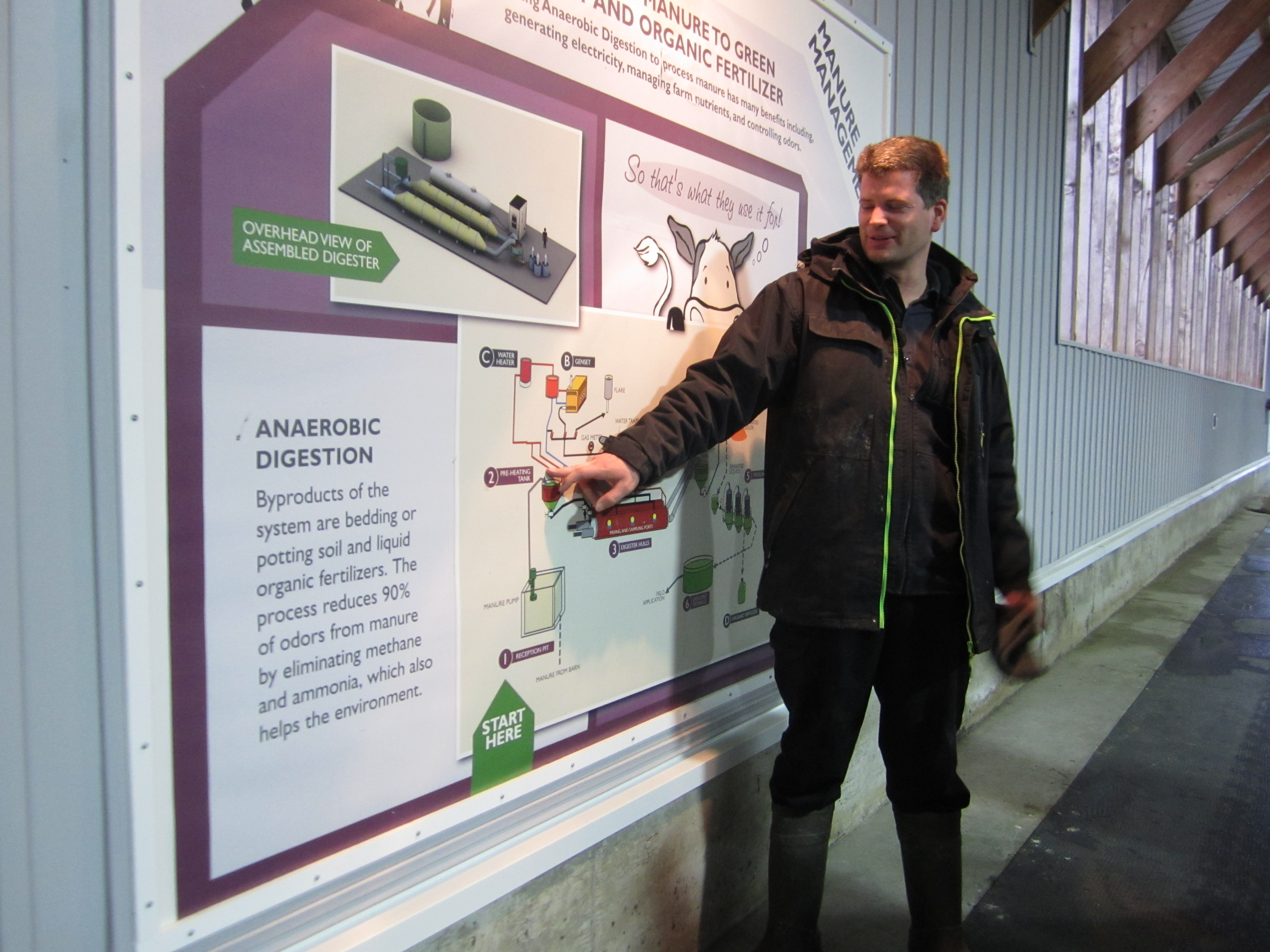
Activities for the agriculture sector included a subcommittee meeting, technical breakout sessions, and a site visit. Allison Costa (United States) chaired the subcommittee meeting, which included updates from Argentina, Canada, China, Finland, Jordan, Pakistan, Taiwan, Thailand, and the United States. Canada provided a CCAC update on efforts to develop an agricultural initiative for the coalition. The Subcommittee also presented for discussion a draft report titled Successful Applications of Anaerobic Digestion from Across the World. The report highlights the benefits of anaerobic digestion systems and presents a variety of global case studies. The Subcommittee expects to release the final report within the next six months.
Agriculture technical
breakout sessions provided information on tools and technical considerations
for biogas projects, case studies, and project financing options. As part of the
Expo site tours, approximately 25 people traveled to an innovative small-scale anaerobic
digester system at the 50-cow Bakerview EcoDairy
 in Abbotsford, B.C. Designed by Avatar, the system produces electricity and hot
water; the digested manure is separated, with the solids used for bedding or fertilizer
and the liquid treated and used as fertilizer.
in Abbotsford, B.C. Designed by Avatar, the system produces electricity and hot
water; the digested manure is separated, with the solids used for bedding or fertilizer
and the liquid treated and used as fertilizer.
Coal
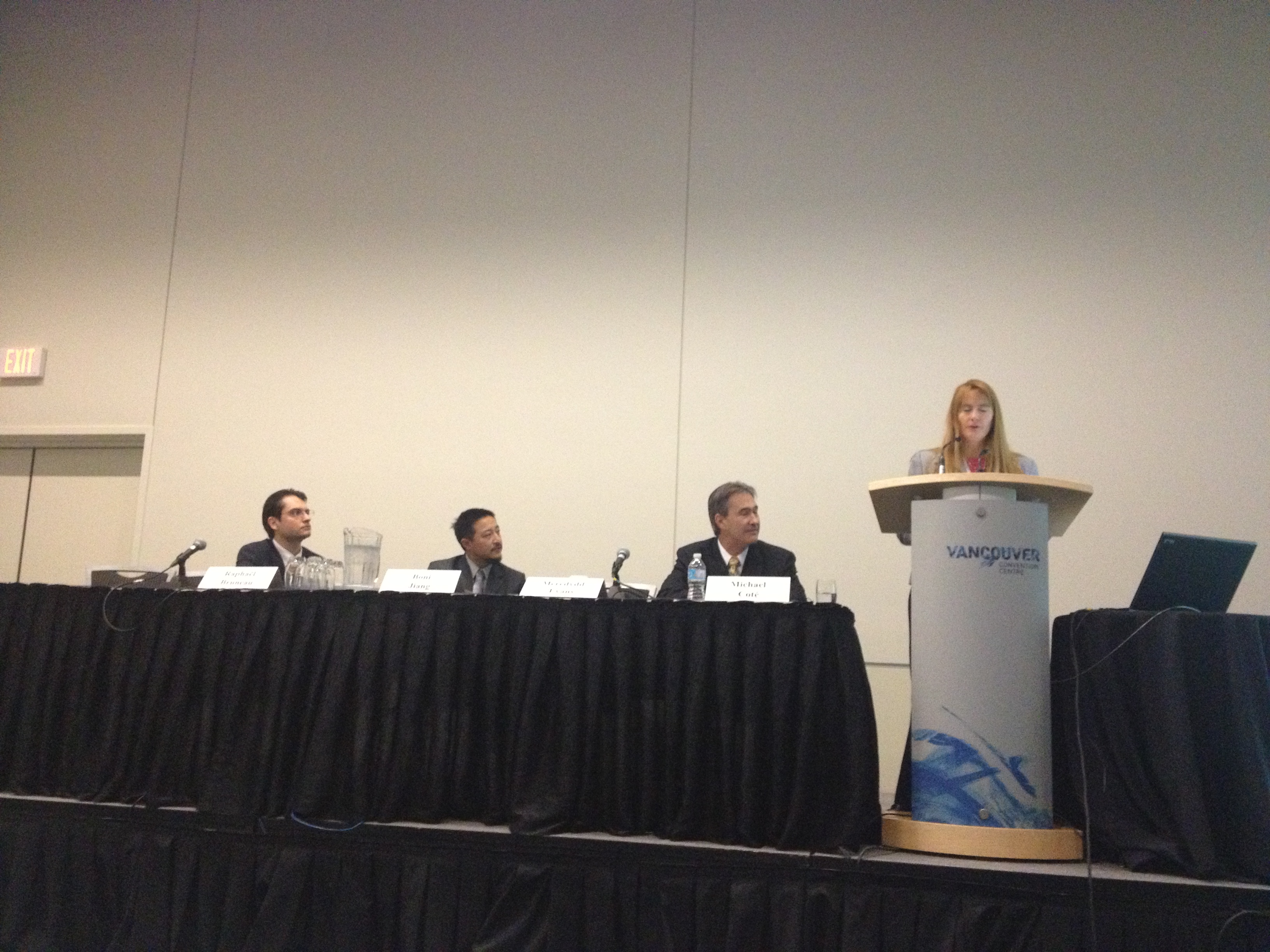 Meredydd Evans from the Joint Global Change Research Institute speaks to the Coal
subcommittee during the technical finance session.
Meredydd Evans from the Joint Global Change Research Institute speaks to the Coal
subcommittee during the technical finance session.
This sector’s activities included a subcommittee meeting and technical and policy
sessions. Co-Chairs Felicia Ruiz (United States), A.K. Debnath (India), and Huang
Shengchu (China) provided opening remarks and welcomed 70 participants, the largest
number of attendees at the Coal Subcommittee meetings to date. Speakers from Australia,
China, and India highlighted updates to their countries’ coal mine methane (CMM)
policies. Delegates from China, India, Mongolia, Poland, Turkey, Ukraine, and the
United States provided highlights on recent and future CMM activities. The Chair
of the United Nations Economic Commission for Europe (UNECE) Ad Hoc Group of Experts
on CMM provided an update on efforts to promote and disseminate
Best Practice Guidance for Effective Methane Drainage and Use in Coal Mines
 ,
a publication co-written under the auspices of UNECE and GMI. Future action items
for the subcommittee include reviewing the
U.S. Coal Sector Action Plan and the
U.S. Country Action Plan, developing other country-specific Coal Sector
Action Plans, updating information in the
CMM Technology Database, and adding new projects to the
International CMM Project Database
,
a publication co-written under the auspices of UNECE and GMI. Future action items
for the subcommittee include reviewing the
U.S. Coal Sector Action Plan and the
U.S. Country Action Plan, developing other country-specific Coal Sector
Action Plans, updating information in the
CMM Technology Database, and adding new projects to the
International CMM Project Database
 .
Breakout sessions
during the Expo presented opportunities in financing and technology and examined
best practices for the capture and use of CMM and ventilation air methane, featuring
case studies from Vietnam and China.
.
Breakout sessions
during the Expo presented opportunities in financing and technology and examined
best practices for the capture and use of CMM and ventilation air methane, featuring
case studies from Vietnam and China.
Municipal Solid Waste
Activities for the MSW sector included a subcommittee meeting, technical sessions, and two site visits. More than 40 people attended the MSW Subcommittee meeting, presided over by co-chairs Diana Milena Rodriguez Velosa (Colombia) and Tom Frankiewicz (United States). Delegates presented country updates for Mexico, Bulgaria, Serbia, Poland, Finland, Colombia, Canada, the Philippines, Germany, Pakistan, Argentina, and Brazil. Presentations were made on the results of a questionnaire to guide future subcommittee priorities, the launch of a CCAC initiative targeting improvements in waste management in large urban centers, and the planned release of a new Central Eastern European LFG generation model later this year. The subcommittee also conducted a roundtable discussion on NAMAs in the waste sector. Technical sessions, each of which had 40 to 50 attendees, discussed methane abatement, greenhouse gas reductions from the waste sector, and case studies.
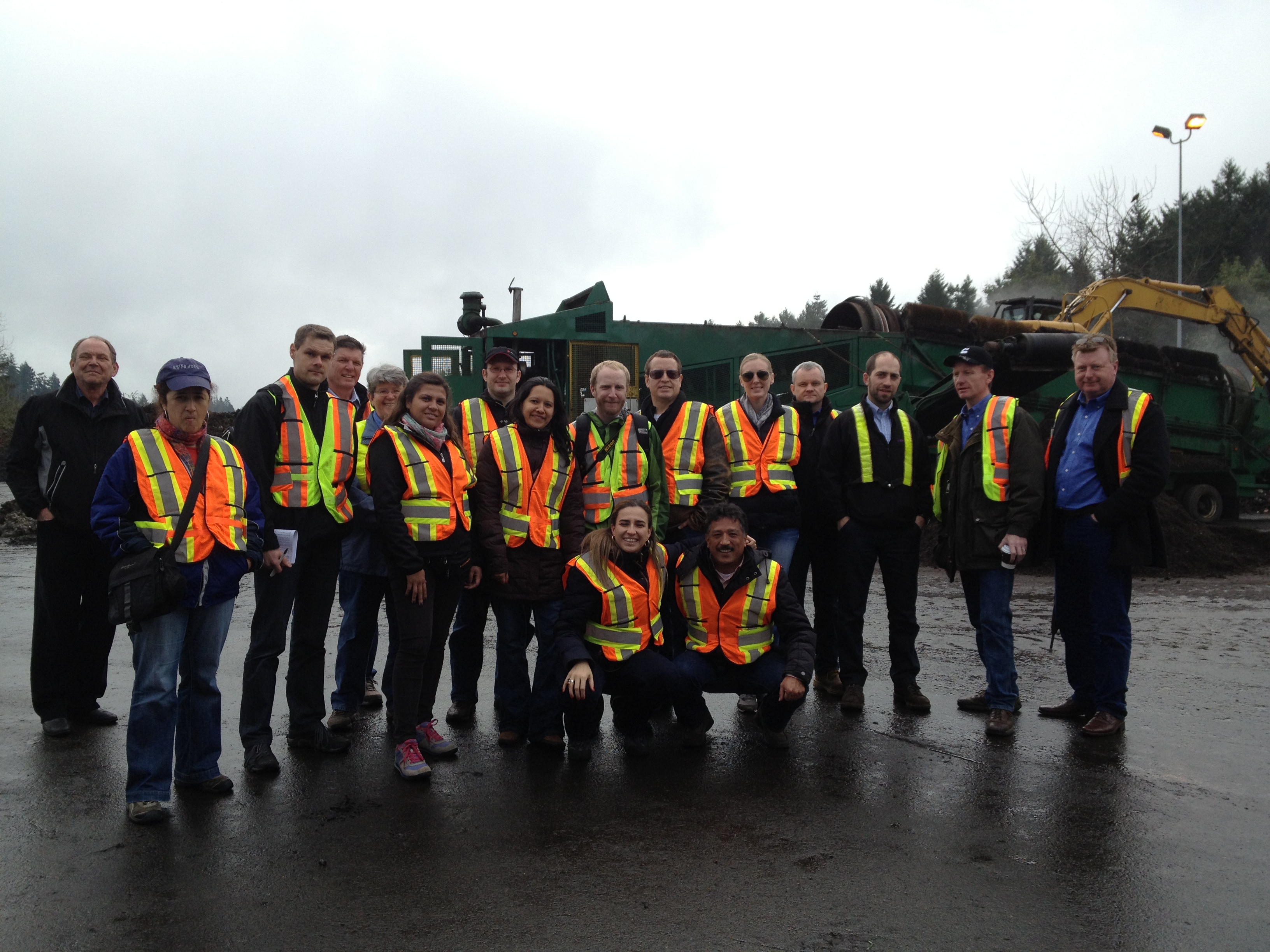 Attendees at the Nanaimo Bioenergy Centre site visit.
Attendees at the Nanaimo Bioenergy Centre site visit.
The MSW Subcommittee representatives participated in two site visits:
- A tour of the Vancouver Landfill and
Harvest Power Composting and Anaerobic Digestion Facility
 .
The Vancouver Landfill has an LFG energy project that heats a greenhouse used to
grow tomatoes and generates electricity that supplies power to around 6,000 homes.
.
The Vancouver Landfill has an LFG energy project that heats a greenhouse used to
grow tomatoes and generates electricity that supplies power to around 6,000 homes. - A visit to the Nanaimo Bioenergy Centre and
ICC Compost and R&D Facility
 on Vancouver Island. Only 30 percent of the waste at Nanaimo gets sent to a landfill;
the other 70 percent of potential MSW is diverted to either the composting facility
or the recycling plant.
on Vancouver Island. Only 30 percent of the waste at Nanaimo gets sent to a landfill;
the other 70 percent of potential MSW is diverted to either the composting facility
or the recycling plant.
Municipal Wastewater
Municipal wastewater sector activities included a
subcommittee meeting, technical sessions, and a site visit. Subcommittee
Co-Chairs Chris Godlove (United States) and Federico Grullón (Dominican Republic)
welcomed 18 representatives from seven different countries: Canada, the Dominican
Republic, Finland, Japan, Mexico, Turkey, and the United States. Technical sessions
included presentations about wastewater biogas modeling and measurement, opportunities
for wastewater biogas recovery and use, and innovative case studies. Participants
toured the Annacis Wastewater Treatment Plant, which is home to a
full scale co-digestion pilot project
 that is testing biogas production with different high-strength organic wastes.
that is testing biogas production with different high-strength organic wastes.
Oil and Gas
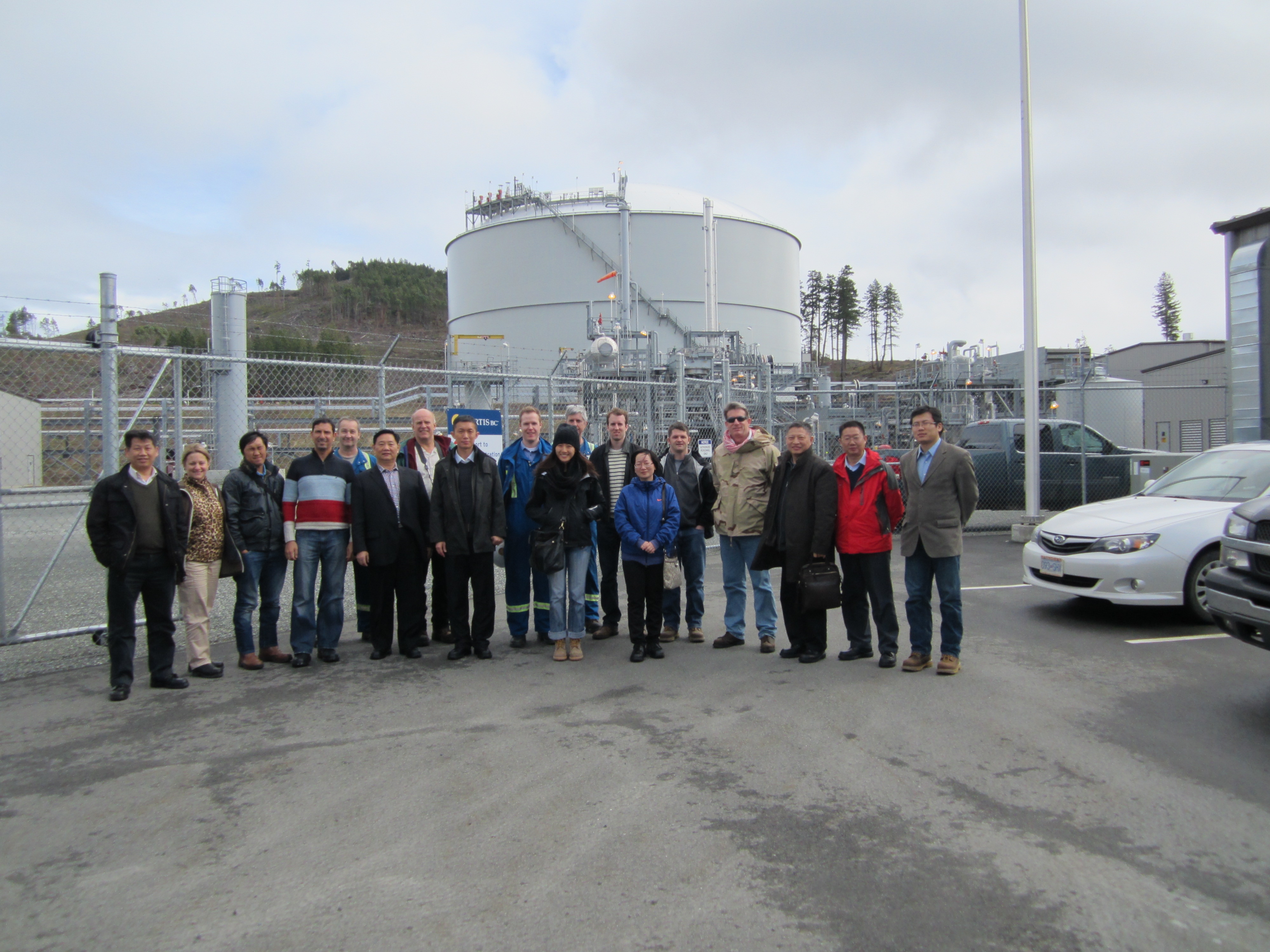
During the subcommittee meeting, members gave brief updates on activities supporting their strategic methane reduction goals. The representatives from the European Commission reported on their new action plan and possible areas for collaboration with GMI. Additional country updates were given as part of the technical and policy sessions and, in total, ten GMI countries (Canada, China, Colombia, Indonesia, Mexico, Norway, Sweden, Thailand, the United States, and Ukraine) and the European Commission provided updates. During technical and policy sessions, more than 20 presentations covered several key topics, including best practices for evaluating and reducing emissions from oil and associated gas production, approaches to methane emission detection and measurement, and best practices for capturing and utilizing methane emissions in the oil and gas industry. Representatives from Forward Looking Infrared (FLIR) and Heath Consultants gave a hands-on demonstration of their FLIR GF Series and OPGAL EyeCGas infrared cameras, which are used to identify methane gas leaks.
For the site visit, the group toured the Fortis Mt. Hayes peak shaving liquid natural gas (LNG) storage facility. This recently built facility allows for more efficient use of existing pipeline systems.
In January 2013, CCAC launched an
Oil and Gas Initiative
 .
The Initiative focuses on reducing venting, leakage, and flaring of natural gas
from global oil and gas operations. Supported by Australia, Denmark,
France, Italy, Nigeria, Norway, Sweden, United
States, United Kingdom, the United Nations Environment Programme
(UNEP), and the World Bank, the Oil and Gas Initiative seeks to 1) accelerate and
expand global methane and black carbon emission reductions, building upon and scaling
up achievements of the Natural Gas STAR International
Program
.
The Initiative focuses on reducing venting, leakage, and flaring of natural gas
from global oil and gas operations. Supported by Australia, Denmark,
France, Italy, Nigeria, Norway, Sweden, United
States, United Kingdom, the United Nations Environment Programme
(UNEP), and the World Bank, the Oil and Gas Initiative seeks to 1) accelerate and
expand global methane and black carbon emission reductions, building upon and scaling
up achievements of the Natural Gas STAR International
Program
 ,
GMI, and the
Global Gas Flaring Reduction Partnership
,
GMI, and the
Global Gas Flaring Reduction Partnership
 ;
and 2) showcase progress by companies in addressing short-lived climate pollutants.
;
and 2) showcase progress by companies in addressing short-lived climate pollutants.
GMI Outreach
Asia
January 2013. Mongolia. The Mongolian
Nature and Environment Consortium
 ,
a U.S. EPA grantee for GMI coal-related activities in Mongolia, coordinated a series
of meetings in Ulaanbaatar with key ministry officials–including the Ministry of
Mining, the Mineral Resources Authority, and the Ministry of Environment and Clean
Development–to further efforts to reduce methane emissions in the country’s mining
sector.
,
a U.S. EPA grantee for GMI coal-related activities in Mongolia, coordinated a series
of meetings in Ulaanbaatar with key ministry officials–including the Ministry of
Mining, the Mineral Resources Authority, and the Ministry of Environment and Clean
Development–to further efforts to reduce methane emissions in the country’s mining
sector.
February 2013. India’s Secretary of Coal and representatives from the Central Mine Planning and Design Institute (CMPDI) and the Central Institute of Mining and Fuel Research (CIMFR) met to discuss the country’s CMM activities and its continued role in GMI and the Coal Subcommittee. The meetings were joined by representatives from U.S. EPA, the U.S. Embassy in Delhi, and the U.S. Agency for International Development. Participants discussed the work plan of the India CMM Clearinghouse (located at CMPDI), as well as India's new policies to clarify CMM ownership on federal lands. Officials were also briefed on the new GMI CMM pre-feasibility study underway at the Sawang mine, operated by Central Coalfields Ltd. in the Damodar Valley.
Europe
December 2012, Poland. Krakow’s Instityut Nafti I Gazu (i.e., the Oil and Gas Institute)
hosted a workshop with sessions on LFG energy projects in Poland and training on
a computer support system for economical assessment of LFG projects.
Presentations
 ,
from the workshop are available in English and Polish. Additional discussions were
held regarding the forthcoming Central Europe LFG model and future plans for LFG
project support.
,
from the workshop are available in English and Polish. Additional discussions were
held regarding the forthcoming Central Europe LFG model and future plans for LFG
project support.
February 2013, Ukraine. In preparation for the GMI Coal Subcommittee meeting at Methane Expo 2013, U.S. EPA staff met with government officials, NGOs, and mining industry representatives in Kiev and Donetsk, Ukraine. Staff held meetings with representatives of the Ministry of Energy and Coal Industry, the Ministry of Ecology and Natural Resources, and the Donetsk State Regional Administration, among others, to encourage participation at the Expo. Both ministries expressed support for working cooperatively on CMM activities, and sent a large delegation to the Expo, which included the Minister of Ecology and Natural Resources. Additionally, the Ukrainian government nominated three new delegates to the Coal Subcommittee.
Central America/South America
Energy Innovation Contest for Latin America and the Caribbean
Individuals, enterprises, and organizations based in Inter-American Development Bank (IDB) borrowing member countries are invited to submit proposals focusing on the adoption, innovation, assimilation, development, and transfer of technologies in renewable energy, energy efficiency, climate change mitigation, and fossil fuel substitution. Proposals must be submitted by 1 July 2013, via the IDB’s Ideas webpage
 .
.
December 2012, Chile. KDM Energia began its evaluation of possible LFG utilization
projects at three landfills (Parque
El Guanaco,
Parque El Retamo,
Laguna Verde). U.S. EPA staff evaluated characteristics at
Colihues–La Yesca and
Cerro Colorado. All of the sites were determined to be well-operated,
and consultants are estimating LFG generation and recovery potential. Chile’s Ministry
of Environment, with support of CCAP and funding from Canada, is working to implement
a solid waste NAMA for management of organic waste from industrial and municipal
sources. The first step of this project was determining the feasibility of using
community waste for composting, dry fermentation, or wet fermentation. The
results of the study
 were presented at Methane Expo 2013.
were presented at Methane Expo 2013.
February–March 2013, Brazil. Officials with the City of Rio de Janeiro held meetings
with U.S. EPA and Clinton Climate Initiative/C-40 Cities to discuss and coordinate
participation in the
CCAC MSW Initiative
 to reduce short-lived climate pollutants. The city has established ambitious goals
related to waste management in the lead-up to hosting the 2014 World Cup and the
2016 Olympics. Brazilian Association of Waste Management (ABRELE), a U.S. EPA-grantee,
hosted a workshop on LFG Management and launched the
GMI Methane Atlas for the Waste Sector in Brazil
to reduce short-lived climate pollutants. The city has established ambitious goals
related to waste management in the lead-up to hosting the 2014 World Cup and the
2016 Olympics. Brazilian Association of Waste Management (ABRELE), a U.S. EPA-grantee,
hosted a workshop on LFG Management and launched the
GMI Methane Atlas for the Waste Sector in Brazil
 .
With more than 300 participants, the Secretary of the Environment of the State of
Saõ Paolo hosted a workshop, which focused on the release of a
manual designed to help municipalities plan for solid waste management
.
With more than 300 participants, the Secretary of the Environment of the State of
Saõ Paolo hosted a workshop, which focused on the release of a
manual designed to help municipalities plan for solid waste management
 .
.
Project Updates and Recent Developments
Inventory of Mexican Landfills
In January, U.S. EPA hosted the
16th Annual Landfill Methane Outreach Program Conference
 and Project Expo. Presentations that GMI stakeholders may be interested in include
those from the International Panel and information on small-scale LFG vehicle fuel
projects.
and Project Expo. Presentations that GMI stakeholders may be interested in include
those from the International Panel and information on small-scale LFG vehicle fuel
projects.
Local Governments for Sustainability, Mexico Office
(ICLEI)
 completed an analysis of the current MSW situation in Mexico’s southeast region
(Chiapas, Oaxaca, Quintana Roo, and Yucatan states) to identify opportunities for
LFG energy projects. The analysis inventoried landfills from 350 municipalities
representing almost 40 percent of the municipalities in the country. Information
collected included volume and type of waste, landfill characteristics, composting
and recycling actions, and environmental education initiatives. ICLEI is now assisting
the city of Othon P. Blanco in Quintana Roo in preparing bidding documents for a
pilot LFG energy project.
completed an analysis of the current MSW situation in Mexico’s southeast region
(Chiapas, Oaxaca, Quintana Roo, and Yucatan states) to identify opportunities for
LFG energy projects. The analysis inventoried landfills from 350 municipalities
representing almost 40 percent of the municipalities in the country. Information
collected included volume and type of waste, landfill characteristics, composting
and recycling actions, and environmental education initiatives. ICLEI is now assisting
the city of Othon P. Blanco in Quintana Roo in preparing bidding documents for a
pilot LFG energy project.
In this edition:
- Thank You, Vancouver! Expo Draws Hundreds from Around the World
- Committee Updates
- GMI Outreach
- Project Updates and Recent Developments
ASG Corner
Thanks to all who participated in Methane Expo 2013! We enjoyed meeting with new country delegates and Project Network members and hope that attendees found the Expo to be a valuable and educational experience. Monica and I were very busy during the Expo–participating in a three-day Steering Committee meeting and various other subcommittee meetings. We are now moving forward on the outcomes from our discussions, including revising guidance on action planning, developing a Partnership-Wide Accomplishment Report, planning an all-Partnership meeting in 2014, and brainstorming on other ways to celebrate GMI’s 10-year anniversary next year. We will be seeking your input on these activities over the coming months–so look for our emails in your inbox!
Thanks again to everyone who participated in the Expo, with a special thanks to our excellent hosts in Canada!
Sincerely,

Henry Ferland
Co-Director, ASG

Monica Shimamura
Co-Director, ASG


